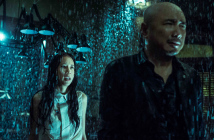
Editor’s Notes: Dixieland, The Purple Plain, & Journey to the Seventh Planet will be released on their respective formats on April 5th.
Dixieland

Dixieland (IFC Films) focuses on the plight of Kermit (Chris Zylka), newly released from prison, who returns to the impoverished town of Pearl, Mississippi. Though determined to steer clear of the law and lead a clean life, Kermit underestimates the grim influence of his surroundings. When he develops a relationship with a neighbor, Rachel (Riley Keough), who dances in a seedy club to support her ailing mother and has accumulated huge medical bills, the pair resolve to overcome their depressing circumstances. But this will draw Kermit back into a cycle of crime he wanted desperately to avoid.
Though the story is familiar, writer/director Hank Bedford throws light on the limited opportunities available to ex-cons, however well-meaning they are. As one door after another is closed in Kermit’s face, the only option he sees for getting enough money to pay off her Mom’s medical bills and get out of Pearl to start a decent life with Rachel is the only means he’s known — crime. So, lured by the cliche of “one last job,” Kermit goes down a dangerous path.
Zylka turns in an effective performance as a young man whose prospects, after prison, are limited to a trailer home, a disappointed mother (Faith Hill), friends trying to lure him back into a life of crime, and hardly any real opportunities to reboot his life. Bedford frames his story with interviews of actual natives of the deep South, many poor, marginalized, and trapped in bleak socio-economic circumstances, who discuss their day-to-day hardships. These interviews appear artsy and don’t really contribute to the impact of the story. It’s as if Bedford is hammering home a point that is perfectly clear in the film’s narrative.
Special features on the widescreen DVD release include commentary with writer/director Hank Bedford and actor Chris Zylka, deleted scenes, and the film’s theatrical trailer.
The Purple Plain

The Purple Plain (Kino Lorber) stars Gregory Peck as ace Canadian squadron leader Bill Forrester in this World War II drama that takes place in Burma. Having lost his bride in a Luftwaffe air raid, bomber pilot Forrester has become a tortured soul who suffers from nightmares. His men and commander (Anthony Bushell) believe he is dangerous to fly with because he takes far too many risks and appears to have a death wish. However, his courage and flying skills are exceptional. The squadron physician is assigned to determine the embittered pilot’s fitness for duty.
Filmed in Ceylon (now Sri Lanka) to substitute for Burma and released in 1954, this nearly forgotten Technicolor production combines traditional war drama action with a psychological portrait. Peck offers a solid performance as Forrester. Director Robert Parrish presents a sympathetic perspective on Forrester and Peck’s star power gets the viewer in his corner, but the movie explored the collateral effects of war well before the medical profession had a fuller understanding of wartime trauma. Forrester fights his interior demons without seeking help and, in the process, endangers human life — his own and others. A romantic relationship with a Burmese woman (Win Min Than) gives him a new outlook on life.
The screenplay is by Eric Ambler (A Night to Remember, Topkapi), who wrote several scripts for such early dramatic anthology shows as Climax, Kraft Theatre, and Suspicion.
There are no bonus features on the unrated, widescreen Blu-ray release.
Journey to the Seventh Planet

Journey to the Seventh Planet (Kino Lobber), a 1962 Danish-American co-production, opens in the far distant year of 2001. The United Nations has sent a special team of scientists to explore Uranus. This group discovers a planet similar to Earth, complete with a small, Danish-looking village filled with beautiful women. Underneath this utopian veneer is a force that uses the crew’s memories against them so it can take their spaceship back to Earth and conquer it. Directed by Sidney W. Pink (Reptilicus, The Angry Red Planet), the film stars John Agar, a regular leading man in low-budget science-fiction films of the era.
This B movie has an interesting premise: by 2001, space travel has become commonplace and with it peace on Earth. The United Nations rules the planet and rivalries among nations have ceased in the name of the common good. However, the movie can’t help but slip into one cliche after another. Combined with sub-par acting and bargain-basement special effects, the primary entertainment value is seeing how bad things get.
There are two kinds of bad movies. One that is just a series of missteps in which inept plotting and scripting result in a dull product that fails to draw us in. The other is well-intentioned but turns out to be pure camp. Think of Plan 9 From Outer Space or Bride of the Monster, two of Ed Wood’s cinematic treasures, and you get the idea. They’re so bad, they are highly entertaining. Journey to the Seventh Planet falls into this category. It’s so jaw-droppingly awful that you just have to see what comes next. The dialogue is especially wacky and the actors deliver it with dead seriousness. Wonderful!
Bonus features on the Blu-ray release include audio commentary by film historian Tim Lucas and the theatrical trailer.



